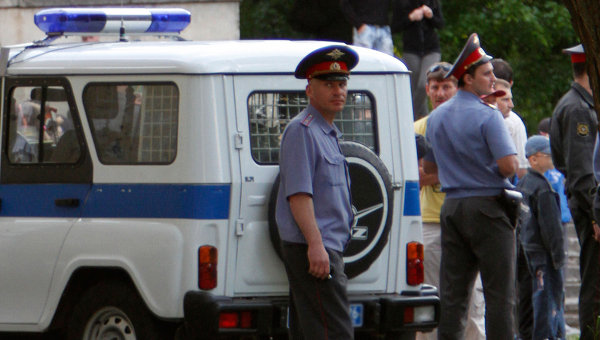
Allegations of Human Rights Abuses by the Government Agents Remain Unaddressed in the North Caucasus
Publication: Eurasia Daily Monitor Volume: 9 Issue: 90
By:

On May 3, Russian human rights center Memorial filed materials with the Russian Investigative Committee concerning rights abuses in the North Caucasus. The collected evidence comes from four republics: Chechnya, Ingushetia, North Ossetia and Kabardino-Balkaria. On April 18, the Investigative Committee’s chief, Alexander Bastrykin, signed an order that created a special department that would investigate crimes committed by the police and other law enforcement agencies. Memorial resolved to follow up on this decision of the authorities and asked investigators to check the lawfulness of the law enforcement’s actions in 26 cases (https://north-osetia.kavkaz-uzel.ru/articles/205997/, May 3).
The list of crimes presented by Memorial indicates that human rights in the North Caucasus are still routinely abused by the government agencies. Memorial is known for its highly professional approach to documenting human rights abuses, having extensive experience working under duress in such places as Chechnya. After the killing of one of Memorial’s primary investigators in Chechnya, Natalya Estemirova, in 2009, the human rights organization was forced to reduce its presence in this republic.
Memorial’s chairman, Oleg Orlov, briefly described the cases in a supplementary letter: “All of these cases [that Memorial filed] exemplify the participation of law enforcement agents in violent crimes, such as murders, rapes and torture. In all of these cases, the crimes’ perpetrators have remained unpunished so far. In most cases, criminal investigations were launched, but the crimes have not been investigated. In a majority of the cases, the victims either filed complaints with the European Court of Human Rights or are preparing such complaints now” (https://north-osetia.kavkaz-uzel.ru/articles/205997/, May 3).
The list of crimes highlighted by Memorial demonstrates the prevalence and pattern of human rights abuses in the North Caucasus. The crimes repeat the same scheme over and over again. At the initial stage, a person is arrested or kidnapped by the security services, then he is detained and interrogated – using torture – and finally he either is released or found dead. In Memorial’s list, there were surprisingly few cases from Chechnya – only six – while Kabardino-Balkaria featured as many as 11 cases. This is due not only to the rise of the insurgency and general instability in Kabardino-Balkaria in the past several years, but also due to the rights activists’ significantly easier access to Kabardino-Balkaria than to Chechnya.
Ramzan Kadyrov still holds tight control over the outflow of information from the republic, restricting the rights activists’ access to reliable data on the abuses that are committed in Chechnya. Yet, occasionally information leaks occur even under Kadyrov. On April 22, Chechen police and insurgents clashed in Gudermes district of the republic. Two police officers, Aslan Jamaldaev and Ahmad Adalaev, and two insurgents, Ahmed Bantaev and Bislan Alkhazov, were killed in the fighting. Later, local residents of Komsomolskoye village alerted the rights activists that people in uniform arrived in the village on April 24 and burned down the houses that belonged to parents and grandparents of the killed insurgent, Ahmed Bantaev. All people inside both houses were driven out, and they were not allowed to take anything with them, not even their documents, as the people in uniform set the houses ablaze. Implementing the principle of collective punishment, Ramzan Kadyrov and other Chechen officials had stated on numerous occasions that insurgency members’ relatives were to be held responsible for their rebel kin (https://chechnya.kavkaz-uzel.ru/articles/206117/, May 5). In no other republic of the North Caucasus, apart from Chechnya, does the police openly burn down houses of the rebels – much less, their relatives’ houses. Although the police sets rebel houses on fire or destroys them with explosives elsewhere, some excuse usually is given for such actions, at least.
In Dagestan, following the insurgents’ brazen suicide attack on a police checkpoint in Makhachkala on May 3, the security services unleashed a series of arrests, using dubious methods. On May 8, brothers Rashid and Arsen Ismailov were kidnapped on two separate occasions by servicemen who introduced themselves as people “from the FSB.” The elder brother, Arsen, was tortured with electric shocks, but subsequently released. The kidnappers allegedly told Arsen that Rashid was in their hands and, if Arsen did not tell them who organized the explosion on May 3, they would put the blame on his younger brother Rashid. When the Islmailov brothers’ relatives tried to file an appeal with the office of the prosecutor general of Dagestan, the prosecutors refused to accept it until the plaintiffs received extensive instructions from a lawyer. It also took Arsen Ismailov significant effort to receive a medical examination in order to pursue his case in court. Head of the Memorial branch in Dagestan, Yelena Denisenko, commented: “We regularly encounter this attitude in the hospitals that apparently have an unspoken rule, which forbids them to perform medical examinations without the prosecutors’ consent, probably to avoid uncovering ‘wrong’ beatings. Even in Arsen Ismailov’s case, although he had received a concussion, the doctors concluded he had received ‘light health damage,’” Denisenko said (https://dagestan.kavkaz-uzel.ru/articles/206354/, May 10).
The Russian government’s refusal to follow up on the crimes committed by the police and security agencies betrays the government’s weakness rather than its strength. Indeed, if the authorities were sure of the general population’s support, they would not hesitate to bring police officers to justice. The authorities’ actions and attitudes in some of the republics in the North Caucasus, however, have been so polarizing that the police is the only force Moscow can still rely on. This essentially means that Moscow is forced to accept any methods the police uses in the North Caucasus, and the police makes full use of this opportunity.




